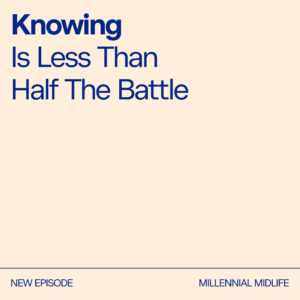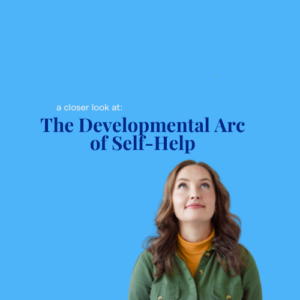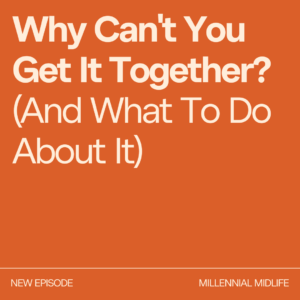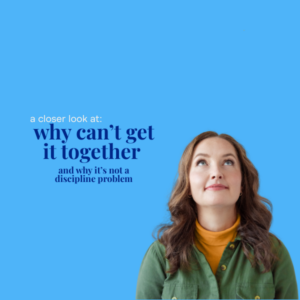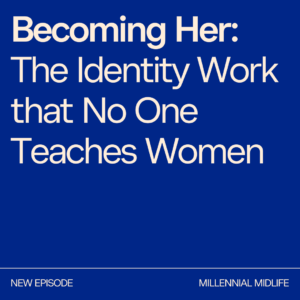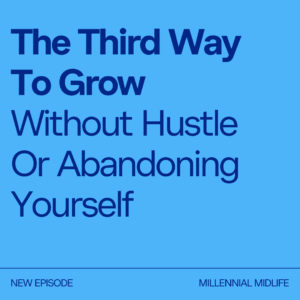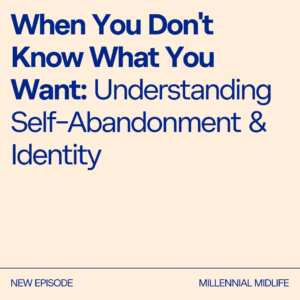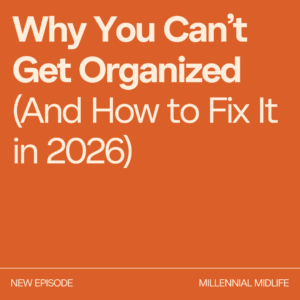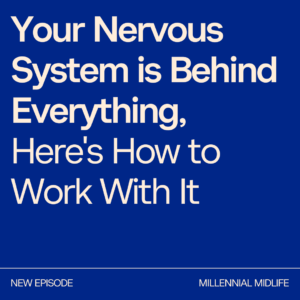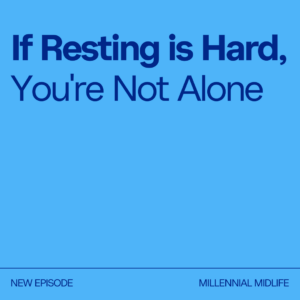Cecelia Baum Mandryk (00:01.09)
Hey and welcome to Calmer Conversations. I’m Cecilia, your host. Today we’re going to talk about your body and your, specifically that your body doesn’t need to be fixed to be loved. We are in springtime here in the US in the Northern hemisphere and that means that a lot of people are getting bombarded with fitness apps, with bikini ready body things, with diets, with all sorts of stuff. And let’s be honest, if you’re
a human existing in this world, you are almost constantly bombarded with this kind of thing. And so we’re talking, this is something that comes up in my coaching spaces a lot, especially with people in midlife, maybe in particular, maybe because it’s our bodies are changing. And by midlife, mean anything from like 30 through 60s, right? This kind of these middle decades where we’re in the core of our life in that kind of messy middle part where we’re doing a lot of the work and
our bodies are no longer these young things and we’re kind of figuring out how to live with them. And if you’re a woman and if you’ve had kids, then you also, your body goes through all sorts of changes as you go through that. Even if you don’t have kids, your body goes through all sorts of changes just because of the natural arc of women’s fertility and what that means through perimenopause and menopause. There is this general kind of way
of thinking about our bodies that they need to be fixed in order to be loved. And we think about this in terms of our life too, right? My life needs to be perfect and then I’ll be happy. My body needs to be a certain way and then I can love it. My body needs to be a certain way or I need to be a certain way before I can rest, before I can feel worthy. But I want to offer you something different today, a softer place to land, a softer place to be with your body. And…
that is that you can start loving it now. You can start accepting now or even feeling neutral about it right now. And neutral being this kind of space between feeling negative about it or feeling like you need to fix it to love it and this other place of feeling really positive about it. Okay. I know that last episode I said that I wanted to start doing a little bit of a landing first. We’re going to do that in a minute. So stick with me. But
Cecelia Baum Mandryk (02:19.682)
This is going to be another, I guess most of my episodes are short and sweet, but tune in, right? If you’re in middle of doing something right now, maybe pause, take a breath, listen with maybe a different ear, particularly if this is the first time you’re listening to this episode.
Allow yourself to be here. Okay, we live in a place, you live in a world, I live in a world that constantly tells us that our body is a problem, that our body is too soft, that our body is too big, that our body is too tired, that it’s too emotional, that it’s too loud. And we get this message all the time that if you fix this, then you will be happy, then you will feel better. If you fix your body, your body is the problem, it’s your enemy.
It’s an adversary, it’s something you need to conquer, it’s something you need to wage a war with, and if you fix it, if you do vanquish your body, then all of the sudden you will feel happy, you will feel successful, you will feel thin, you will feel small enough to be acceptable to everyone else around you. But the fixing becomes this lifelong project, and it becomes exhausting, and it disconnects us from our body, which is really a vehicle for us experiencing our life.
Right? So when we’re trying to fix our body, when we’re disconnected from our body, it stops becoming this thing that allows us to experience life and it becomes this, I don’t know, this enemy, this like thing that is in this obstacle, I guess, that’s in the way of us feeling good about ourselves. And we think that if we fix it, that we will feel better. But sort of like I need to get a degree in order to feel accomplished, that doesn’t actually work.
Here’s what I want you to hear. You don’t need to fix your body to feel peaceful in your body. You don’t even need to fix your body to like your body. You don’t have to earn love by belonging or shrinking or striving. I want you to ask the question, what if I didn’t have to do anymore? What if I didn’t have to change my body in order to love it? What if I could see my body as an ally, as a way to experience the life that I’m living? Okay, so now let’s do a little bit of grounding, right? I want you to take
Cecelia Baum Mandryk (04:32.686)
a few intentional breaths, maybe making a sigh or sound for an exhale. If you’re in a place where you can close your eyes or soften your gaze, do that. If you’re walking or driving or doing cutting onions or something, you might just hone in on the tasks that you’re doing. You might bring your focus there. So taking those breaths, maybe a few breaths in through your nose and out through your mouth.
Cecelia Baum Mandryk (04:58.112)
and then switching to breathing in and out through your nose.
Cecelia Baum Mandryk (05:07.424)
and seeing if you can start to move your attention to your physical body.
if you can just start to notice it.
Maybe notice the surface that’s supporting you, whether it’s your car seat or the ground underneath your feet as you walk or stand or chair.
Cecelia Baum Mandryk (05:30.284)
You might notice physical sensations that are present, maybe something in your toes, your legs, maybe in your belly, your chest, your back, maybe something in your hands.
You might even intentionally feel the crown of your head reaching towards the sky.
Cecelia Baum Mandryk (05:51.31)
your spine stretching, it being rooted in the bowl of your pelvis, maybe even your sitz bones connecting with whatever you’re sitting on if you are seated. And you might even say to yourself, this is where I am, this is my body, I am here right now.
Cecelia Baum Mandryk (06:14.87)
And I want to see if you can notice one part of your body that feels OK right now. One place where there might be comfort or ease.
Cecelia Baum Mandryk (06:26.326)
Or one part of your body that perhaps you feel appreciative of right now. So perhaps if you’re doing something like cutting onions, you might feel appreciative of your arms and your hands, your coordination, maybe even your eyes for seeing, perhaps your hands for feeling. You might notice the sensation of the steering wheel underneath your fingers and have appreciation for that.
You might feel the muscles of your legs working as you walk and have appreciation. And you might even say, I’ll add to yourself if you can. I’m so thankful for.
Cecelia Baum Mandryk (07:02.348)
And you might even take a moment to notice how your body shows up for you over and over again, even on hard days.
Cecelia Baum Mandryk (07:17.134)
And then I want you to check in with yourself and ask yourself a question. If my body was my ally, if we were here in this together and it was a vehicle for me experiencing life, how might I start to treat it? How might I talk to it?
Cecelia Baum Mandryk (07:37.238)
If your body was okay just as it was and you didn’t need to do anything to fix it, how might you talk to your body?
If you knew that you had a perfectly imperfect human body, even with all of its flaws and pains and aches and whatever it has right now.
How might you say, how might you talk to it? How might you be thankful for it? What might you say to it?
You might say something like, my body is not a project, it’s my partner in this life.
Cecelia Baum Mandryk (08:16.908)
You might even say something like, there’s no need to earn love. I’m already worthy.
or it is okay to feel okay about my body right now.
Cecelia Baum Mandryk (08:31.498)
My body is not something to fight. It is something I can partner with.
Cecelia Baum Mandryk (08:38.956)
And this idea that your body is your partner, that it’s a vehicle that can shepherd you through this life is really powerful, right? This idea that you can listen to your body, that you can trust your body, that you can love it and be grateful for it because it is on your side. I’m going to say that again, that your body is a vehicle for experiencing the fullest life that you can. That it’s okay to listen to it. It’s okay to trust it. It’s okay to love it.
and be grateful for it because your body is on your side. And when you start treating your body like it is on your side and you let go of the idea that your body is against you, then things start to shift and change. So if you’d like some homework from this episode, you might ask yourself, what thoughts are getting in the way of me loving my body or appreciating my body? What stories do I have that my body needs to be fixed in some way?
When you notice these critical thoughts, might pause and you might ask yourself, there another way to say this? Is there another way I would like to talk to myself? Would I ever say this to a friend’s body or a friend?
Cecelia Baum Mandryk (09:47.948)
And you might try and do this for a week. Try and notice when you’re being critical, you might start to tap in, you might start to have appreciation for your body every night or ask how you wanna feel about your body each morning and see how things start to shift and change. Thank you so much for listening. Thank you so much for being here. Make sure you come find me on Instagram or join the Life Lab if you’d like to do this work. This is actually…
This episode is inspired by a lesson that we did in the in the life lab Which means that we talked about this for an entire hour people were able to ask questions had much more Many more exercises and guided reflections and things like that So if this is something that you like and you want to do more of it Please come join us or keep listening here come follow me on Instagram. Make sure you like and save things and I will see you the next time. I love you so much. Have a great one. Bye




